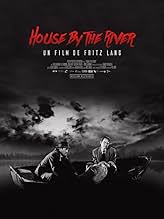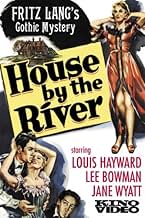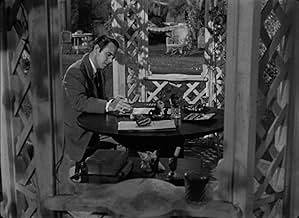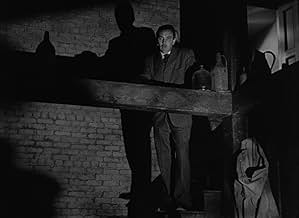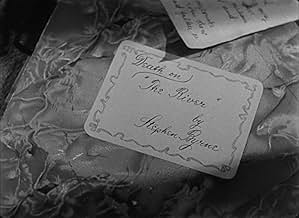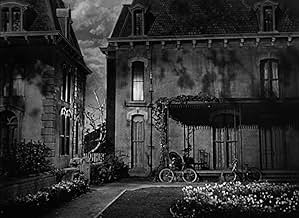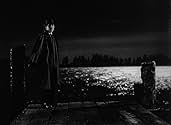AVALIAÇÃO DA IMDb
7,0/10
4,6 mil
SUA AVALIAÇÃO
Adicionar um enredo no seu idiomaA deranged writer murders a maid after she resists his advances. The writer engages his brother's help in hiding the body, causing unexpected problems for both of them.A deranged writer murders a maid after she resists his advances. The writer engages his brother's help in hiding the body, causing unexpected problems for both of them.A deranged writer murders a maid after she resists his advances. The writer engages his brother's help in hiding the body, causing unexpected problems for both of them.
Bob Burns
- Courtroom Spectator
- (não creditado)
Edgar Caldwell
- Square Dancer
- (não creditado)
Edward Clark
- Minor Role
- (não creditado)
Frank Dae
- Col. Davis
- (não creditado)
- Direção
- Roteiristas
- Elenco e equipe completos
- Produção, bilheteria e muito mais no IMDbPro
Avaliações em destaque
House by the River is something of an anomaly; it's more of an old-dark-house Gothic than the grittier dramas, from Fury to Beyond A Reasonable Doubt, which Fritz Lang made in his American period. (The location of this house is a worrisome and amateurism anomaly, too; the conventions, milieu and some of the accents suggests that it's an English country estate, but much else argues that the film takes place in the U.S.) Would-be writer Louis Hayward, getting flirtatious with the maid in the absence of his wife (Jane Wyatt), accidently strangles her when she resists his advances. His brother (Lee Bowman) reluctantly agrees to cover up for him and help sink the body in the sinister, ever-present river that runs by the edge of the property; the resulting scandal of the disappeared servant bolsters the writer's flagging career. When suspicion begans to gather around his innocent brother, Hayward, by now seriously demented, couldn't be more pleased. But then Wyatt comes across a hidden manuscript; Hayward (you see), flushed by his phoney success, resolves to write "what he knows...."
Edward Cronjager's heavily shaded cinematography and Georges Anthiel's brooding score help fill out Lang's dark, clammy vision, making the river -- forever disgorging its flotsam and jetsam -- a principal character in the action. House by the River is a good old-fashioned thriller, particularly in its Gothic closing scenes, but it's not in a class with Lang's films at the top of his American form, like Scarlet Street, The Big Heat or Human Desire.
Edward Cronjager's heavily shaded cinematography and Georges Anthiel's brooding score help fill out Lang's dark, clammy vision, making the river -- forever disgorging its flotsam and jetsam -- a principal character in the action. House by the River is a good old-fashioned thriller, particularly in its Gothic closing scenes, but it's not in a class with Lang's films at the top of his American form, like Scarlet Street, The Big Heat or Human Desire.
Failing novelist Stephen Byrne (Louis Hayward) murders his maid and manipulates his brother John (Lee Bowman) into helping him dispose of the body. Later, after it has been found, he sees a chance to pin the crime on John, whom he eventually tries to kill, too (making it look like suicide). 'House by the River' is suffering from one essential downside: The plot is illogical. While Stephen does everything to let suspicion fall on his brother, he is at the same time working on a new novel (following the advice of a neighbour to focus on things he knows) about a murder - a novel that is as good as an admission of guilt. And if he puts all this into that novel, which after all he intends to publish, why is he so desparate to prevent his wife Marjory (Jane Wyatt) from reading the manuscript? Despite all this, I am rating 'House by the River' 7 stars. That is because it is well-acted and beautifully photographed. Especially the eerie scenes on the river (with its murky and brackish water) are great. In sum, this is by no means one of Fritz Lang's best films, far from it. But it has some important points in its favour.
The unsuccessful writer Stephen Byrne (Louis Hayward) tries to force his servant Emily Gaunt (Dorothy Patrick) sexually while his wife Marjorie Byrne (Jane Wyatt) is visiting a friend and accidentally strangles her. His crippled brother John Byrne (Lee Bowman) coincidently comes to his house in that moment, and Stephen asks him to help to get rid of the corpse and avoid an scandal, since his wife would be pregnant. The naive and good John helps his brother to dump the body in the river nearby his house. Stephen uses the disappearance of Emily to blame her and promote his book. When the body is found by the police, all the evidences points to John, and he becomes the prime suspect of the murder.
"House by the River" is a dark and tense movie with one of the most despicable characters I have ever seen. Louis Hayward is perfect in the role of a scum, capable of killing, defaming, lying, falsely accusing, and maintaining cold blood. Jane Wyatt and Lee Bowman complete the efficient trio of lead cast. Fritz Lang uses with mastery the shadows and lights in the black and white cinematography as usual. The story is very tense, but the conclusion is very abrupt and quite conventional, moralist and commercial. In my opinion, this excellent film deserved a darker and amoral ending to become another masterpiece of this outstanding director. My vote is nine.
Title (Brazil): "Maldição" ("Curse")
"House by the River" is a dark and tense movie with one of the most despicable characters I have ever seen. Louis Hayward is perfect in the role of a scum, capable of killing, defaming, lying, falsely accusing, and maintaining cold blood. Jane Wyatt and Lee Bowman complete the efficient trio of lead cast. Fritz Lang uses with mastery the shadows and lights in the black and white cinematography as usual. The story is very tense, but the conclusion is very abrupt and quite conventional, moralist and commercial. In my opinion, this excellent film deserved a darker and amoral ending to become another masterpiece of this outstanding director. My vote is nine.
Title (Brazil): "Maldição" ("Curse")
Louis Hayward utters this chilling line. His brother, Lee Bowman, has a physical disability. He has always been loyal to Hayward. But Hayward is looking out for number one -- big time.
I had seen a terrible print of this movie once years ago and figured it to be lesser Fritz Lang. Not so! It is certainly one of the very best of his American movies. It's beautifully filmed, extremely well plotted, and cast superbly.
It is, in summary, a terrifying movie.
The Hayward character is responsible for a killing very early in the plot. He had not intended it, though his motives were not very high in the circumstance causing it. He doesn't care whom he drags down to keep his name clear and finish the book he is writing about the crime.
In addition to excellent performances by Hayward, Bowman, and Jane Wyatt as Hayward's wife, the supporting cast is a dream: Plump Jody Gilbert is pathetic and hateful simultaneously as Bowman's maid. Ann Shoemaker gives a touch of comic relief -- but just a touch -- as a nosy neighbor of Hayward and Wyatt.
Like the best of Lang -- "The Big Heat," "Fury," "M," "Metropolis," and the Mabuse films -- this concerns morality and its lack. There is a Biblical feel to it, as evidenced in the quote from Hayward (Cain) regarding his fine brother Abel/Bowman.
It could scarcely be better than it is.
I had seen a terrible print of this movie once years ago and figured it to be lesser Fritz Lang. Not so! It is certainly one of the very best of his American movies. It's beautifully filmed, extremely well plotted, and cast superbly.
It is, in summary, a terrifying movie.
The Hayward character is responsible for a killing very early in the plot. He had not intended it, though his motives were not very high in the circumstance causing it. He doesn't care whom he drags down to keep his name clear and finish the book he is writing about the crime.
In addition to excellent performances by Hayward, Bowman, and Jane Wyatt as Hayward's wife, the supporting cast is a dream: Plump Jody Gilbert is pathetic and hateful simultaneously as Bowman's maid. Ann Shoemaker gives a touch of comic relief -- but just a touch -- as a nosy neighbor of Hayward and Wyatt.
Like the best of Lang -- "The Big Heat," "Fury," "M," "Metropolis," and the Mabuse films -- this concerns morality and its lack. There is a Biblical feel to it, as evidenced in the quote from Hayward (Cain) regarding his fine brother Abel/Bowman.
It could scarcely be better than it is.
For some reason, the great director chose to degrade this film on some occasions, yet at other times he would revel in details of the film's opening quarter-hour. However, at the time that he made this film, he was despondent over the collapse of his Diana Productions which was a co-venture with Joan Bennett and her husband Walter Wanger. With no offers in sight from the majors, Lang chose to visit "Poverty Row" which may have left him with bad memories of a film of which he should have been more pleased.
In HOUSE BY THE RIVER, we have Lang working at the bargain basement Republic Pictures, where Orson Welles had just made a similar descent to make MACBETH. In each case, the decline was only in budget, not in quality. In Lang's case, we have a film that plays as a great companion piece to his SECRET BEHIND THE DOOR, both being a change of pace Gothic thriller from the master of spies and noir.
Incidentally, the promise of artistic freedom offered at Republic did stop when Lang attempted to cast a black actress as the maid. We're just lucky that Vera Hruba Ralston (wife of company head Yates) wasn't cast as the wife.
The screenwriter, Mel Dinelli, working from the A.P. Herbert novel, was a past and future hand at these "house" mellers - he previously did the screenplay for THE SPIRAL STAIRCASE and would do BEWARE, MY LOVELY in 1952. He segued well from Robert Siodmak to Fritz Lang as long-time Langian themes such as conscience and fate are in evidence here. Oddly, it is not the lead who suffers a conscience. Hayward's Stephen Byrne, a hack writer who has been lusting for the new maid played by Dorothy Patrick, revels in his self-promoted celebrity now that she's "disappeared." She's actually been accidentally murdered by Stephen, who had been filled with lustful thoughts as the maid bathed and seems to have a near orgasm as he hears the bathwater go down the drain outside the house - the look on Hayward's face is priceless.
It's his brother John who aided him in hiding the body (and who is referred to as having gotten his brother out of other scrapes) who turns to drink to quell his conscience and who is the primary suspect in the inquest. Little does he know that his brother is subtly implicating him in the crime in toto. His fate would be that no good deed (siblingly speaking) goes unpunished. The brother is played by Lee Bowman, and it's the only role of his in which I can say he's memorable. That's not to say that otherwise he's a forgettable player, just that he's not distinguishable from a bunch of mustachioed players who came out while the head ranks were off to war and who quickly had to retreat once they returned.
Hayward is so enjoying his celebrity that he's signing books by day and wife Jane Wyatt refers to him being out all night and smelling of cheap perfume when he comes home. She's beginning to realize that Lee Bowman's John Byrne is the better of the brothers, although the story implies that she was his own unrequited love.
But as unsympathetic as Stephen Byrne may be, before an audience ever rooted for Robert Walker trying to retrieve his lighter in STRANGERS ON A TRAIN, we share Stephen's fears of the body doing some synchronized swimming with the deer. While attempting to retrieve it, he only makes it worse for himself by accidentally (he can't do much right it seems) opening the top of the sack and letting out some flowing blond hair to make it even more obvious. When Stephen later finds that his brother's monogram is on the sack, he breaks into a devilish smile of contentment.
Cinematographer Edward Cronjager works well with Lang on their second pairing (the previous one was the gorgeous Technicolor WESTERN UNION). When the body (in a sack) starts popping up in the river, we recall the image of a floating deceased deer from earlier in the film and a character's claim that it shows up at about the same time every day given the tide.
If the ending seems rushed, it's only a reflection of the lead character's madness (a quick snap), unlike the state of mind of Chris Cross (Edward G. Robinson) at the ending of SCARLET STREET which is more detailed. It could have been a bit tidier, but maybe the head man cut the budget and schedule short. It was known to happen at Republic.
In HOUSE BY THE RIVER, we have Lang working at the bargain basement Republic Pictures, where Orson Welles had just made a similar descent to make MACBETH. In each case, the decline was only in budget, not in quality. In Lang's case, we have a film that plays as a great companion piece to his SECRET BEHIND THE DOOR, both being a change of pace Gothic thriller from the master of spies and noir.
Incidentally, the promise of artistic freedom offered at Republic did stop when Lang attempted to cast a black actress as the maid. We're just lucky that Vera Hruba Ralston (wife of company head Yates) wasn't cast as the wife.
The screenwriter, Mel Dinelli, working from the A.P. Herbert novel, was a past and future hand at these "house" mellers - he previously did the screenplay for THE SPIRAL STAIRCASE and would do BEWARE, MY LOVELY in 1952. He segued well from Robert Siodmak to Fritz Lang as long-time Langian themes such as conscience and fate are in evidence here. Oddly, it is not the lead who suffers a conscience. Hayward's Stephen Byrne, a hack writer who has been lusting for the new maid played by Dorothy Patrick, revels in his self-promoted celebrity now that she's "disappeared." She's actually been accidentally murdered by Stephen, who had been filled with lustful thoughts as the maid bathed and seems to have a near orgasm as he hears the bathwater go down the drain outside the house - the look on Hayward's face is priceless.
It's his brother John who aided him in hiding the body (and who is referred to as having gotten his brother out of other scrapes) who turns to drink to quell his conscience and who is the primary suspect in the inquest. Little does he know that his brother is subtly implicating him in the crime in toto. His fate would be that no good deed (siblingly speaking) goes unpunished. The brother is played by Lee Bowman, and it's the only role of his in which I can say he's memorable. That's not to say that otherwise he's a forgettable player, just that he's not distinguishable from a bunch of mustachioed players who came out while the head ranks were off to war and who quickly had to retreat once they returned.
Hayward is so enjoying his celebrity that he's signing books by day and wife Jane Wyatt refers to him being out all night and smelling of cheap perfume when he comes home. She's beginning to realize that Lee Bowman's John Byrne is the better of the brothers, although the story implies that she was his own unrequited love.
But as unsympathetic as Stephen Byrne may be, before an audience ever rooted for Robert Walker trying to retrieve his lighter in STRANGERS ON A TRAIN, we share Stephen's fears of the body doing some synchronized swimming with the deer. While attempting to retrieve it, he only makes it worse for himself by accidentally (he can't do much right it seems) opening the top of the sack and letting out some flowing blond hair to make it even more obvious. When Stephen later finds that his brother's monogram is on the sack, he breaks into a devilish smile of contentment.
Cinematographer Edward Cronjager works well with Lang on their second pairing (the previous one was the gorgeous Technicolor WESTERN UNION). When the body (in a sack) starts popping up in the river, we recall the image of a floating deceased deer from earlier in the film and a character's claim that it shows up at about the same time every day given the tide.
If the ending seems rushed, it's only a reflection of the lead character's madness (a quick snap), unlike the state of mind of Chris Cross (Edward G. Robinson) at the ending of SCARLET STREET which is more detailed. It could have been a bit tidier, but maybe the head man cut the budget and schedule short. It was known to happen at Republic.
Você sabia?
- CuriosidadesFritz Lang originally wanted a black woman to play the role of Emily Gaunt, but the producers refused.
- Erros de gravaçãoThe women are dressed in turn of the century type clothing but the men are wearing modern hats and suits.
- Citações
John Byrne: You must be very, very ill Stephen...
Stephen Byrne: Ill?
- ConexõesFeatured in Le documentaire culturel: Le funeste destin du docteur Frankenstein (2018)
- Trilhas sonorasTurkey in the Straw
(uncredited)
American folk song
Author unknown
Principais escolhas
Faça login para avaliar e ver a lista de recomendações personalizadas
- How long is House by the River?Fornecido pela Alexa
Detalhes
- Data de lançamento
- País de origem
- Idioma
- Também conhecido como
- House by the River
- Locações de filme
- Empresa de produção
- Consulte mais créditos da empresa na IMDbPro
- Tempo de duração1 hora 23 minutos
- Cor
- Proporção
- 1.33 : 1
Contribua para esta página
Sugerir uma alteração ou adicionar conteúdo ausente



